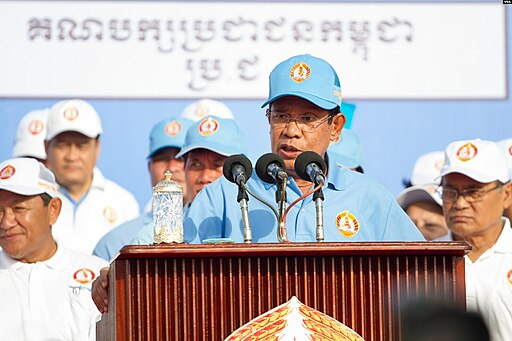Socially constructing Cambodian national identity

Prime Minister Hun Sen addressing a crowd during an election speech in 2018
Jacob Sagers – Upcoming elections in Cambodia have resulted in the banning of its only opposition party. Current Prime Minister Hun Sen has ruled the country for thirty-eight years and is expected to retire at the end of this term. However, banning the opposition Candlelight Party effectively cements his son, a military general, as the country’s next ruler. Mr. Hun Sen is consolidating his power and legacy while reconstructing Cambodia’s political sphere and ultimately its national identity.
National identity is the way people see themselves as a member of a nation. People’s attachment to a nation, a common group or heritage, then generally translates into a commitment to a state, or what is frequently called a country. Cambodia’s national identity has been altered recently with French colonialism and its independence era. However, the Khmer Rouge’s rise to power and subsequent genocide eradicated many traditional and modern traditions. Mr. Hun Sen is the first ruler post-Khmer Rouge and has been left with a country redefining what it means to be Cambodian. His influence and power can create a new political dynasty for his family under the guise of an illiberal democracy amid the next election. Some of his tactics include shutting down the last Cambodian newspaper critical of the government, claiming: “…it had published a false report.” By removing most legal outlets for criticism of his government, it is left for him to set an identity based on his family’s political dynasty. If his regime is successful, it may hold the power to completely redefine Cambodia.
Ideological power, or the ability to get others to do what you want willingly, has a distinct role in shaping how politics is undertaken. Hun Manet’s, Hun Sen’s son, role in the military may be instrumental in achieving this. Militaries generally hold prestige, and in the case of Cambodia, are now separate from the government with the horrors of the Khmer Rouge. Creating popularity for his family may cement the dynasty to the support of Cambodian citizens. Using ideological power, rather than repressive force, is generally a more effective tactic. However, it depends on how Cambodians view his actions. They must decide whether this is the fate they want to undergo, while reckoning with a violent memory of the past.
Picture Credit: Photo distributed under Public Domain in the US. Source

